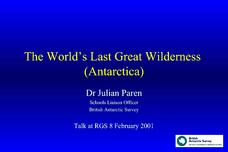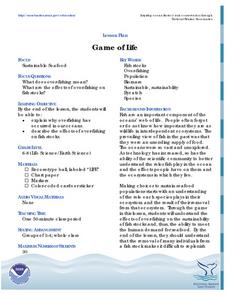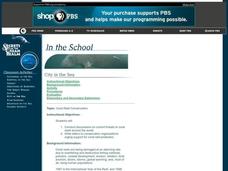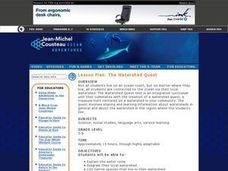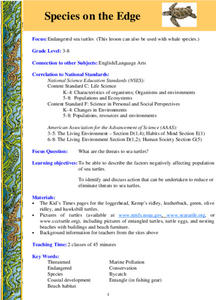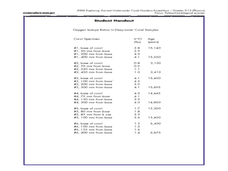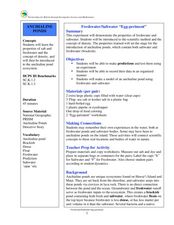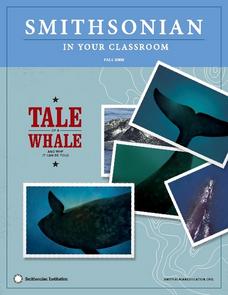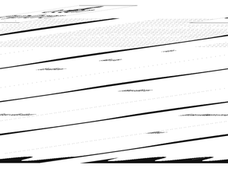Curated OER
Marine Debris
Pupils perform experiments to examine if debris float, or blow in the wind. The effects of these characteristics on the marine debris are then discussed. They determine how a material can influence what becomes marine debris.
Curated OER
A Lesson in Biodiversity: Making Comparisons Between Defensive Mechanisms Utilized by Marine Organisms
If your upper elementary or middle school marine biology learners are going to visit an aquarium, then here is a field trip activity guide for you. It is written specifically for The Maritime Aquarium, but the idea can be adapted to...
Curated OER
The World's Last Great Wilderness (Antarctica)
It's a shame that there are no photographs in this presentation because the information is fascinating! Each identically fashioned slide contains bullet points of information about Antarctica that will enhance an earth science...
Curated OER
Whale Watcher Game Lesson
Young scholars participate in an online whale watching game. They identify the reasons for migration and describe the route. They make predictions on what would happen if the ways did not migrate.
Curated OER
Game of Life
By playing this game, learners discover what happens to a fish stock when large amounts disappear.
Curated OER
Voyage to Kure Viewing Guide
Students complete a worksheet while viewing a video about the oceans. They locate the oceans on a map and identify positive and negative ways in which humans have impacted them. They discuss any questions at the end of the lesson.
Curated OER
Corals & Coral Reefs
Students describe a coral reef, how it is formed and its inhabitants. They explain the ecological and economic importance of coral reefs and discuss its present-day threats. Lesson contains adaptations for all levels.
Curated OER
Coral Reef Conservation
High schoolers conduct discussions on current threats to coral reefs around the world and write letters to conservation organizations urging support for coral reef protection.
Curated OER
The Watershed Quest
Students examine their connection to local watersheds. They describe the water cycle and list species living in their local watershed. They also draw a map of their community.
Curated OER
The Good, The Bad, and the Arctic
High schoolers investigate the social, economic and environmental consequences that might result from Arctic climate change. Students identify and discuss at least three consequences.
Curated OER
Fishing for Solutions
Students investigate the many ecological and economic issues related to over fishing the world's marine resources. Working in committees, students research the related topics of equipment and fishing techniques.
Curated OER
Aquaculture: Down on the Salmon Farm
Students examine the changing practices of aquaculture. They discuss the short term and long term consequences stemming from fish farming.
Curated OER
Species on the Edge
Students describe factors negatively affecting population of sea turtles, and identify and discuss action that can be undertaken to reduce or eliminate threats to sea turtles and other endangered species.
Curated OER
Cutt-Off Genes
Students explore how gene sequence analysis can be used to examine phylogenetic similarities of different organisms. Students work in groups to simulate a gel electrophoresis separation of fragments using poster board to create their gel.
Curated OER
Creating a Pond Habitat
Students create a pond habitat inside and outside their classroom. In this pond lesson plan, students create a habitat with animals, water, and plants in order to create a proper pond habitat.
Curated OER
How can deep-water corals be used to determine long-term patterns of climate change?
Students explore the concept of paleoclimatological proxies. In this paleoclimatological proxies lesson, students explain isotope ratios in deep water coral samples. Students write a paragraph about global climate change as...
Curated OER
Freshwater/Saltwater "Eggs-Periment"
Students explore water properties by conducting a class experiment. In this buoyancy lesson, students utilize freshwater, saltwater, plastic cups, hard boiled eggs and food coloring to experiment with the floating capabilities of salt...
Curated OER
Gone Fishing
Students examine the effects of various methods of fishing on fish populations and biodiversity. They read a handout, participate in a simulation of different fishing methods, record the results, and answer discussion questions.
Curated OER
Food Web Mobile
Students explain the main concepts of food webs and food chains. They
describe the role of animals, plants, and other organisms in cycling energy and matter through a food web by creating mobiles. Lesson contains adaptations for all levels.
Curated OER
Dig Into Ireland
Students explore environments and wildlife of Ireland to find out how they were formed, and how they helped form Irish culture. Students research online to determine connections between present elements in Irish culture and wildlife and...
Curated OER
A Tale of a Whale: And Why It Can Be Told
Students examine the characteristics of particular whales. In this whale characteristics lesson, students discover the methods scientists use to track whales and attempt to match the unique pattern of callosities themselves. A role...
Curated OER
Guetemala's Changing Forest
Eighth graders compare their local ecological zone to the tropical rainforest. In this natural ecology lesson, 8th graders complete an activity about the differences in ecological zones. They compare their biome to the Guatemalan...
Curated OER
Candy Chemosynthesis
Students explain chemosynthesis and photosynthesis using candy. In this chemosynthesis instructional activity, students work cooperatively to create a visual explanation of the chemical equations of photosynthesis and chemosynthesis.
Curated OER
Architects of the Coral Reef
Students discuss reproduction in Cnidaria. in this coral reef lesson, students describe five characteristics of Cnidaria and compare and contrast the four classes. They describe the reproduction strategies they use.
Other popular searches
- Ocean Ecosystems Animals
- Arctic Ocean Ecosystems
- Ocean Ecosystems Activities
- Five Ocean Ecosystems
- Ocean Ecosystems Worksheets




